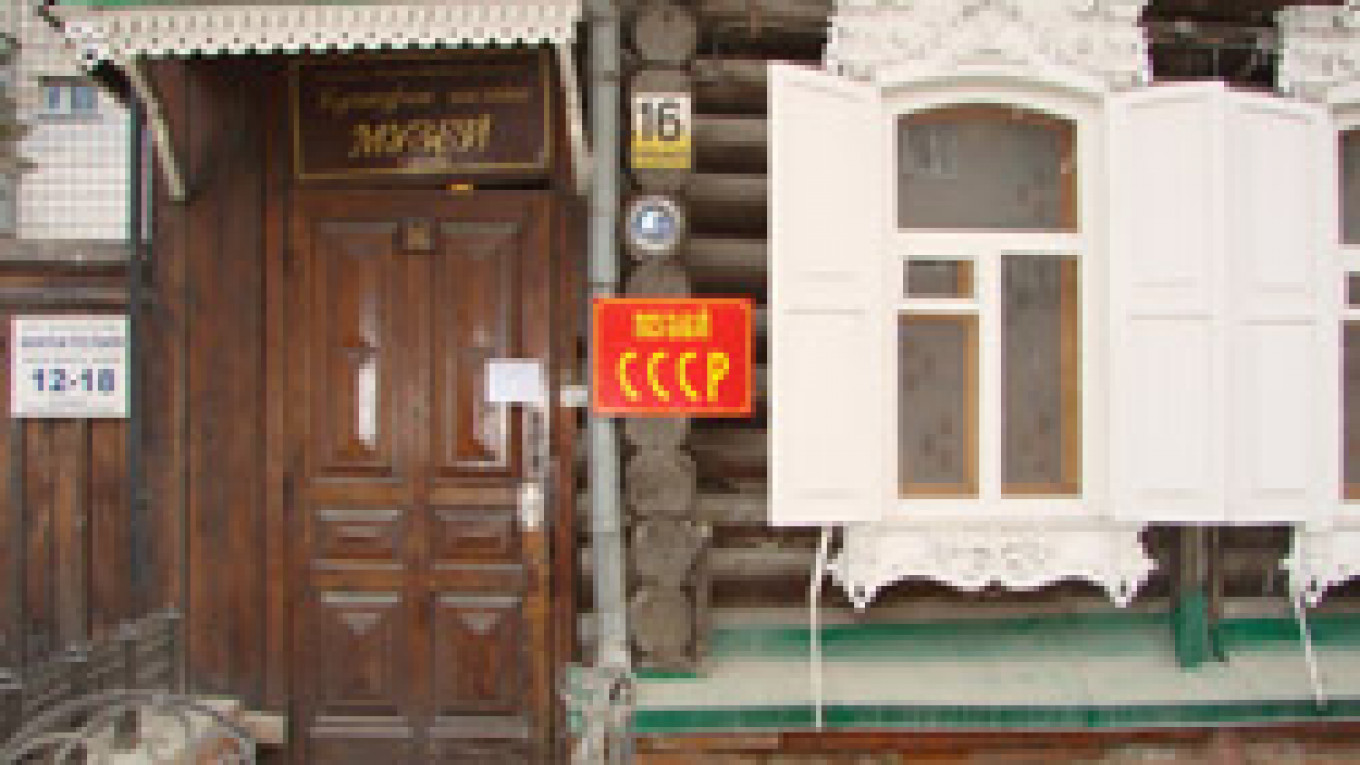Go through the door of a small wooden house in Novosibirsk and you travel back in time to the Soviet Union.
Inside the house are pictures of Soviet leaders — Leonid Brezhnev, Vladimir Lenin — and posters calling for increased production. This is the U.S.S.R. Museum, a private attempt to preserve in aspic the memories of a time missed by some, feared by others.
The museum is the brainchild of Ideya Lozhkina, whose first name is itself a throwback to Soviet times when children were named after Soviet holidays or simply an “idea” as in Lozhkina’s case.
“We wanted to recall the good old days, to show achievements of those times,” said Lozhkina in a recent telephone interview.
The museum displays a typical Soviet spread with tinned peas and herring staring vividly out at the visitor.
Lozhkina also has a museum devoted to Siberian Beryosta, or craft works made from the bark of birch trees in the Siberian city.
Today there are about 250 exhibits in the museum, all brought by ordinary people, said Lozhkina.
The exhibits include chubby souvenir bears from the 1980 Olympic Games, porcelain ballerina statuettes, countless badges and other “Soviet” objects.
Judging from the exhibits, the Soviet Union in Lozhkina’s view is an ideal, if not a bland ideal at times. There is nothing to remind the visitor of the repressions and other horrors in the Soviet Union.
“Of course, we remember those dark sides of the Soviet period. My family went through repressions as well. But our aim [with the museum] was to recall everything that we were proud of, all those good and bright things we had when we lived in the Soviet Union,” she said.

|
|
For MT
Soviet foods shown in not-so-Soviet plastic cups and plates in the museum. |
“Many visitors say that in our museum they feel nostalgia for the old times. And indeed, we were all more kindhearted and responsive in the Soviet Union, we knew how to help each other and face all problems together. Now it’s all gone, unfortunately,” she said.
The museum has had a mixed reception with locals attacking the idea on regional web sites and Memorial, the organization that works to preserve the memory of political persecution in the Soviet Union, condemning the idea.
“The fact that there are no exhibits on repression says a lot,” said Alexander Rudnitsky, the head of Memorial in Novosibirsk. “What we have in Russia now is a revival, but not of those repressed, no. We are witnessing the revival of Stalinism. No one wants to recall the horrors of that time.”
There is no large-scale museum dedicated to repressions in Russia. Moscow has a small museum dedicated to the gulag, which is overshadowed by the large Marc Jacobs designer shop next door on Ulitsa Petrovka.
“I would understand it if there was a museum about repression near her museum,” said Rudnitsky, “But unfortunately there are no such museums in our city. We have several school exhibitions devoted to the gulag and repression, but no one is willing to support them financially.” Attempts have been made to stop those as well, he said.
Despite her nostalgia, Lozhkina is not certain that she would like to go back to the Soviet Union for real.
“We lived in a very stable country. Pensioners could afford much more than they can now. We were confident in tomorrow,” she said. “But on the other hand, in the Soviet Union I couldn’t be a director of two museums. Nowadays there are more opportunities to do what you want.”
A Message from The Moscow Times:
Dear readers,
We are facing unprecedented challenges. Russia's Prosecutor General's Office has designated The Moscow Times as an "undesirable" organization, criminalizing our work and putting our staff at risk of prosecution. This follows our earlier unjust labeling as a "foreign agent."
These actions are direct attempts to silence independent journalism in Russia. The authorities claim our work "discredits the decisions of the Russian leadership." We see things differently: we strive to provide accurate, unbiased reporting on Russia.
We, the journalists of The Moscow Times, refuse to be silenced. But to continue our work, we need your help.
Your support, no matter how small, makes a world of difference. If you can, please support us monthly starting from just $2. It's quick to set up, and every contribution makes a significant impact.
By supporting The Moscow Times, you're defending open, independent journalism in the face of repression. Thank you for standing with us.
Remind me later.


